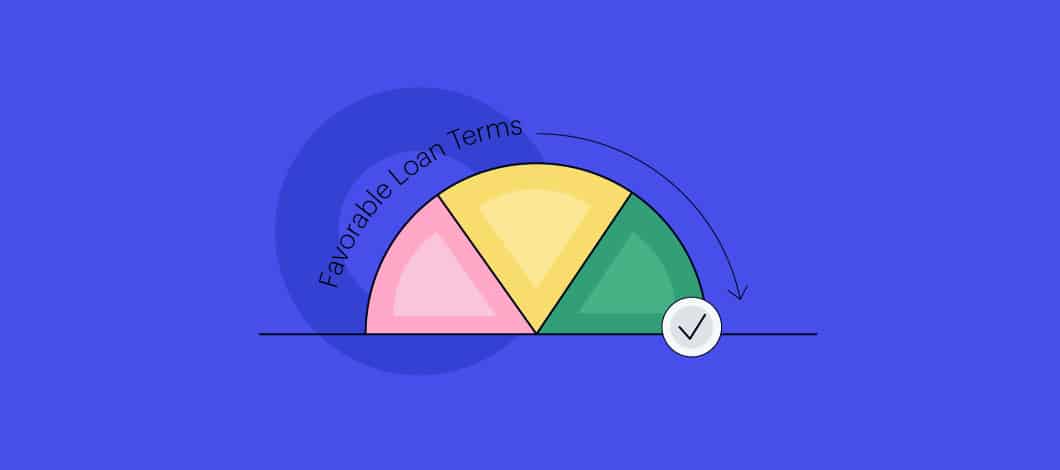Should you renew your small business loan? Learn what a loan renewal is, how to renew a loan and what fees are involved.
What’s a Commercial Loan Renewal?
A commercial loan renewal, by definition, is a business financing agreement based on an existing loan pact that is nearing its original maturity date. The renewal creates a new agreement with a new loan amount and maturity date under terms and conditions that frequently resemble the original deal. The amount is often the same as the original pact, although it may differ.
-
Loan Renewal: An Example
Now that you understand the meaning of a loan renewal, let’s look at an example. Let’s say you take out a loan for $50,000 with a 12-month term, and the loan contains a renewal clause that if you make all your payments on time, at the end of the 12 months, you could renew it for another $50,000 for another 12 months under the same terms.
As the end of the 12 months approaches, you then successfully apply for a loan renewal and receive another $50,000 loan with a 12-month maturity date under the same terms and conditions as the original loan.
What Stays the Same Under a Loan Renewal and What Changes?
The main changes under a loan renewal agreement are that the loan now has a new balance along with a new maturity date. If you haven’t finished repaying your original loan before renewing your loan, the renewed amount will include unpaid principal and interest due from the previous loan.
Terms such as interest rates, repayment plans and late fees typically remain the same as the original agreement, although these types of items may be adjusted in some cases. For instance, if your credit score has improved in the past 12 months, you may receive a better interest rate on your new loan. Conversely, you may see less favorable terms if your credit score has gone down.
Why Loan Renewals Are Used
A loan renewal often serves as a way for lenders to test the creditworthiness of borrowers by initially only extending them part of the amount requested.
For instance, if a borrower wants $100,000 but the lender is only willing to loan them $50,000 upfront because of concerns about credit risk, the lender might agree to build a renewal clause into the loan. This way, the borrower can apply for another $50,000 at the end of the loan maturity date after demonstrating the ability to repay the first $50,000 and reducing the lender’s concern about risk.
Loan Renewal Dates and Clauses
A loan renewal typically builds upon the original loan agreement’s terms, but you may negotiate a renewal clause into an existing contract. A loan renewal clause outlines the terms for renewing the loan. For instance, the borrower may renew the loan at maturity provided they haven’t missed any payments.
A loan renewal clause will often require the borrower to give notice of intent to renew at a specified period before a loan’s original maturity date. The clause may state, for example, that the borrower must give written notice to the lender of an intent to renew financing at least 30 days before the loan’s maturity date.

Loan Renewal vs. Extension
With a loan extension, the original loan remains in place, but the maturity date for the loan gets extended for an amount of time agreed upon between the lender and borrower. This stands in contrast to a loan renewal, where the maturity of the original loan becomes the occasion of a new loan with similar terms.
An extension effectively allows a borrower to delay repaying a loan in full, often for an additional fee. Lenders typically use an extension to allow borrowers to bring their loans current without defaulting or going into collection status.
Loan Renewal vs. Rewriting or Modification
Loan rewriting or modification is another concept related to loan renewal. Rewriting a loan, however, involves making significant changes to the terms of the loan. For example, borrowers having trouble repaying loans may seek modifications that make it easier to repay their loans, such as longer terms, lower rates or even a different type of loan.
Loan Renewal vs. Refinance
Loan refinancing is another type of loan arrangement similar to loan renewals in that they both involve the creation of a new loan. When a loan is refinanced, the original loan agreement is canceled, with any existing debt rolled into a new deal with new terms.
Unlike loan renewals, the terms can be considerably different with refinancing. Loan refinancing is often used by borrowers seeking to lower their payments.
Loan Renewal: What Are the Benefits?
Whereas loan extensions, modifications and refinancing typically help borrowers with difficulty repaying their loans, a loan renewal can benefit borrowers who aren’t facing any repayment difficulties. Renewing your loan can result in the following benefits.
Access a Larger Loan Amount
Agreeing to a loan with a renewal clause can help you secure a more significant loan amount than you’d typically qualify for. A lender who isn’t immediately willing to lend you the entire amount you want may be willing to effectively split the amount over two or more loans through a loan with a renewal option.
By repaying your loan’s original terms, you demonstrate that you’re a responsible borrower. This could increase your lender’s willingness to extend you the entire amount you originally wanted, spaced out over multiple loans.
Gain Access to Funds Earlier
Applying for a loan renewal means you may be able to access funds at an earlier date than you otherwise would. Some loan renewal clauses allow you to apply for renewal well before your original loan matures, such as after you’ve paid off 50% of your total financing amount. This can be advantageous if you need quick access to capital.
Delay Interest Payments
When you split a loan amount over multiple renewals, you also postpone some of the interest you would have initially been required to pay with a larger loan amount. This could help you manage your cash flow better.
Raise Your Credit Score
A loan renewal can help boost your credit score if you make your payments on time and your financing provider reports your history to the credit bureaus. Conversely, for those lenders that don’t report to the credit bureaus, that means the amount you’ve borrowed isn’t listed as additional debt on your credit report.
Leverage More Favorable Loan Terms
A loan renewal can provide you with leverage for negotiating a loan with more favorable terms. Repaying your original loan on time can demonstrate your creditworthiness to your lender and persuade them to offer you a loan renewal with lower rates.
Raising your credit score could also help you secure more favorable loan terms. In turn, this can serve as additional leverage to convince your lender that they’re better off giving you more favorable renewal terms than losing your business to another provider.
How to Renew a Loan
Sometimes lenders will reach out to you if you’re eligible for a loan renewal. However, if they don’t contact you, you can approach them to be considered for additional funding.
Applying for a loan renewal generally involves the same process as applying for an initial business loan. However, a few additional considerations come into play that can add a step to the process.
Step 1: Apply for a Loan with a Renewal Clause
Typically, a loan renewal is based on a clause in an original loan. Therefore, you can significantly improve your chances of approval if you start by applying for a loan with a renewal option.
However, in some cases, lenders may be willing to add an option to an existing loan if you’ve been making your payments on time. If your current loan doesn’t include an option to renew, you can try asking your lender for one.
Step 2: Make Your Loan Payments on Time
To qualify for a loan renewal, you’ll need to make your payments for your original loan on time. This shows you’re a responsible borrower and gives lenders confidence they aren’t taking on a high risk of default by extending a renewal offer to you.
Step 3: Optimize Your Credit Rating
In addition to making payments on time, you can take other steps to improve your creditworthiness and chances of receiving a loan approval. These include:
- Paying bills on time
- Paying down remaining balances on credit cards and other debts
- Correcting any errors on your credit report
- Depositing more money into your business bank account to keep your average bank balance high
- Reviewing your financial statements with your accountant to see if adjusting any items could improve your performance numbers
- Considering whether you have any collateral
- Making sure your business is current with state and federal authorities on all annual reports, licenses and tax filings
- Rereading the terms of your loan contract to make sure you aren’t violating any conditions that could affect your renewal qualifications
Step 4: Compare Your Options
If your credit score or revenue has improved since you applied for your original loan, you may have better financing options at your disposal. Compare your options to determine if a loan renewal offer is the best fit for your business.
Step 5: Submit Your Application
Different lenders and financing types may have distinct policies on when you can apply for a loan renewal. Some may allow you to apply for a renewal as early as halfway through your original loan term, while others may require you to wait until most of your original loan is repaid. If time goes by and you haven’t heard from your lender regarding a loan renewal, contact them about submitting an application.
Before a lender renews your loan, you’ll have to go through an approval process similar to when you took out your original loan. That said, different lenders may have varying requirements regarding what qualifications and paperwork you’ll need.
If you have an existing relationship with a lender, though, they should have much of your information available already, which should streamline the loan renewal process. Additionally, online lenders often have more relaxed re-approval processes than conventional lenders. However, at the very least, you’ll likely need to provide several of your most recent business bank statements.
Because lenders evaluate your renewal application with the same due diligence they would your original loan application, there’s no guarantee you’ll be renewed for your loan. Nonetheless, if you’ve been keeping up with your loan payments, the odds of having a loan renewal approved should be better.
Keep in mind, the renewal process could take time as your lender reviews your finances, so don’t wait until the last minute to begin the process.
Loan Renewal Fees: What Are They?
Since a loan renewal is essentially a new loan, renewing your loan can incur the same types of fees involved in applying for an initial loan. These can include application fees, loan origination fees, processing fees and other charges. However, your lender may have a policy of waiving some or all of these fees for renewal, or they may be willing to waive them upon request. Check with your lender for details.
Additionally, if you renew a loan before you finish paying off your initial loan, you’ll be responsible for repaying any unpaid principal and interest from your original loan.
So in terms of cost, what does it mean to renew a loan for your business? To be clear, before agreeing to commercial loan renewal, check with your lender to see how your obligations under your initial loan will carry over into your new loan.











